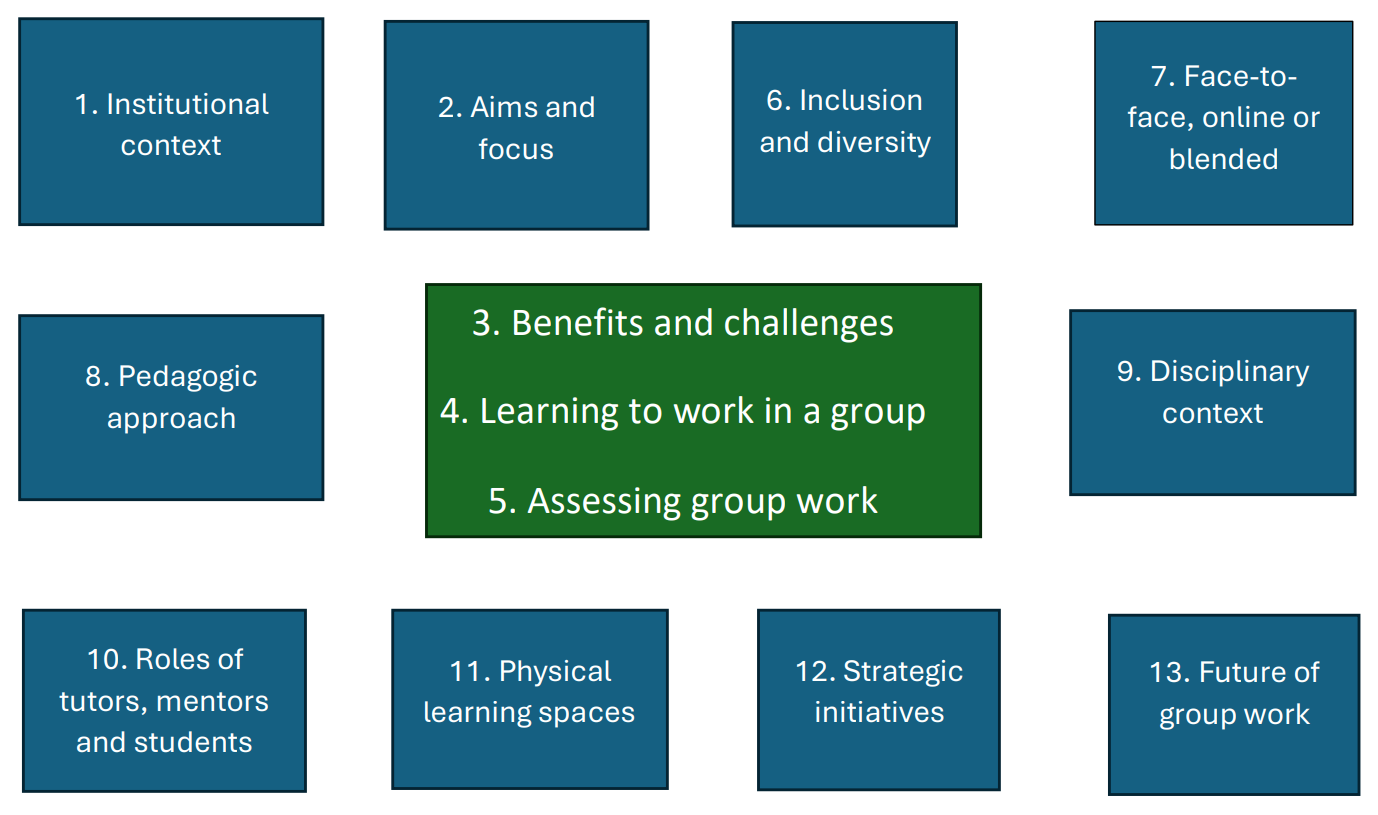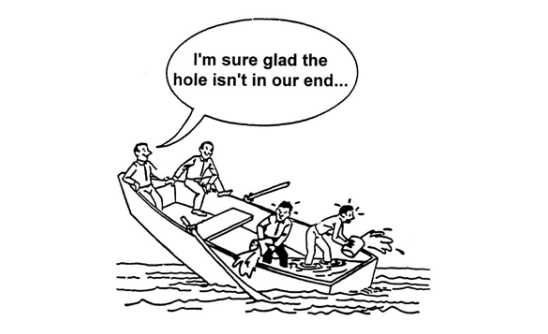
Enhancing student group work

Mick Healey
Managing Director of Healey HE Consultants and Visiting Professor
30 April 2025
“Students probably learn more during group work than any other form of teaching during their higher education journey.” (Francis et al., 2022, 3).
Students have a love-hate relationship with group work in the classroom. Many recognise that they can learn from their fellow students and that the quality of the work they create together is higher than the work they can produce individually. Others, particularly the high-flyers, fear they will do most of the work and may not get the credit they deserve. These varied experiences raise a fundamental question: ‘How can student group work be designed to enhance the learning experience for all students?’
Earlier this year, I was commissioned by the Centre for Education Teaching Innovation (CETI) at Westminster to write a report attempting to answer this question. My approach was to undertake an extensive review of the key literature, almost 200 references, on working in groups and teams in learning and teaching in higher education, and produce a practical guide on enhancing student group work. The emphasis is on student project teams operating over a minimum of several weeks using inquiry-based learning.
“This timely and comprehensive report synthesizes key scholarship on group work, resulting in an essential guide for supporting students working in teams in higher education. The report provides staff and academic developers with a nuanced analysis of both the benefits and challenges of group work, as well as strategies for teaching group work skills and integrating teamwork pedagogies across the disciplines. It’s an invaluable resource.”
(Jessie L. Moore, Elon University Center for Engaged Learning, United States)
The core chapters of the report discuss the benefits and challenges of group work, learning to work in a group, and assessing group work.
Benefits and challenges
Group work is key for delivering the University of Westminster’s Education Strategy. Experiencing collaborative group work is an important way of delivering this strategy, whether through authentic education, transformative learning, or personalised education, as it has been shown to ”develop a range of soft skills including communication, empathy, teamwork, conflict resolution, leadership and self-management; all skills highly sought after by employers, recruiters and other key stakeholders” (McKay & Sridharan, 2024, 221).
The benefits and challenges of group work faced by students and staff overlap. Just as importantly, many strategies may be used to maximise the benefits and minimise the challenges. My argument is that group work has an important role in student learning in higher education, but for it to be effective it needs to be designed to meet the specific context, including the level of the course, number of students, length of the project, extent of diversity, mode of instruction, pedagogical approach, discipline, and learning spaces available (Figure 1).
Figure 1: A framework for exploring facilitating group work in higher education

Learning to work in a group
There is no universal way of working effectively in groups. Among the advice given is building group work skills into learning outcomes, choosing an appropriate way of selecting teams and team sizes to meet the context, and recognising that most teams develop in stages.
Free-riding or social loafing is a major concern in all disciplines. This is when group members do not contribute equally, or at all, to the work. Many strategies may be adopted to reduce this issue. However, care needs to be taken to explore the reasons for social loafing. It is “not necessarily due to apathy or a deliberate attempt to do as little work as possible” (Hall & Buzwell 2013, 37).
There are many activities students can use to help their group develop as a team, including setting ground rules, identifying the different roles team members need to play, and handling problems. Ideally, there should be an explicit across-institution group work strategy developed for programmes to ensure there is a progression of skill development, particularly across the core modules.

Source: Quotesgram https://quotesgram.com/differences-re-analogy-quotes/
Assessing group work
Traditionally, in assessing group work, the emphasis has been placed on the product or outcome of the task or project, but attention is increasingly also being given to assessing the process of group work, a core competency. This makes sense if there is an explicit learning outcome about the acquisition of skills of working in teams. Tutors usually assess the product outcomes of projects as they know the subject material; they may also sometimes assess the processes of working in groups if the project is largely undertaken in the class or laboratory and they can observe and mentor the students in action. However, in most group work projects, the only people who know how the group operates are the students themselves; hence peer and self-assessment is the only valid way to assess the process of group work.
There is much debate as to whether all team members should be given the same mark, whether team members should be assessed individually, or whether it is better to distribute the group mark between individuals to reflect differences in the quality of their contributions, and if so, how best to do this. Many projects use a mixture of group marks and individual marks, with some tasks assessed by the tutor and others by peer and self-assessment. Redistributing group marks between team members can incentivise all students to work to the best of their ability.
Conclusion
Future trends in project group work in higher education are debatable but include, according to ChatGPT, adaptation to rapidly changing communication technologies and gen AI; co-creation with students of group work activities; emphasis on diversity and inclusion; interdisciplinary group learning; personalised and adaptive learning; sustainable and socially responsible projects; blended learning models; and focus on lifelong learning and professional development.
References
Francis, N., Allen, M., & Thomas. J. (2022). Using group work for assessment – an academic’s perspective. Advance HE. https://www.advance-he.ac.uk/sites/default/files/2022-03/Using%20group%20work%20for%20assessment%20%E2%80%93%20an%20academic%E2%80%99s%20perspective.pdf
Hall, D., & Buzwell, S. (2013). The problem of free-riding in group projects: Looking beyond social loafing as reason for non-contribution. Active Learning in Higher Education, 14(1), 37-49. https://doi.org/10.1177/1469787412467123
Healey, M. (2024). Enhancing working in groups and teams in learning and teaching in higher education. A Report for the Centre for Education Teaching Innovation (CETI), University of Westminster, UK. https://www.researchgate.net/publication/382524135_Enhancing_Working_in_Groups_and_Teams_in_Learning_and_Teaching_in_Higher_Education_A_Report_for_the_Centre_for_Education_Teaching_Innovation_University_of_Westminster_UK
McKay, J., & Sridharan, B. (2024). Student perceptions of collaborative group work (CGW) in higher education. Studies in Higher Education, 49(2), 221-234. https://doi.org/10.1080/03075079.2023.2227677
About the Author
Mick Healey (BA, PhD, NTF, PFHEA) is the Managing Director of Healey HE Consultants (https://www.healeyheconsultants.c.uk) and a Visiting Professor at the University of Westminster. He has written and edited 250 papers, chapters, books and guides on teaching and learning in HE. His work has been cited 16,500 times.
- Westminster students reimagine university welcome experience in CETI project - September 26, 2025
- Celebrating Multilingualism at Westminster - September 26, 2025
- Enhancing student group work - April 30, 2025
Leave A Comment